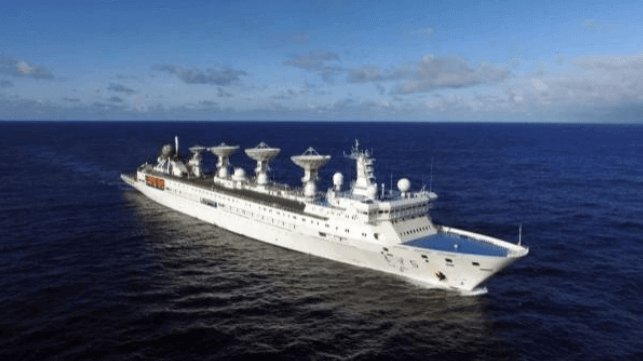Sri Lanka Turns Chinese Naval Vessel Away From Port of Hambantota

Critics of China's Belt and Road program have long warned of the potential military uses of the Chinese-operated port at Hambantota, Sri Lanka, and successive Sri Lankan governments have denied that the port would benefit China's PLA Navy. This past weekend, a Chinese missile tracking ship tried to call at the port, setting off a minor diplomatic scuffle with India and providing new evidence for the critique.
In 2016, a Chinese state-owned enterprise took over the port of Hambantota, Sri Lanka, on exceptionally favorable terms. The Sri Lankan government was heavily in debt to China, and to raise funds, it granted a 99-year lease on the underutilized port complex to China Merchants Port Holdings (CM Port) in exchange for $1.1 billion. For critics of China's Belt and Road development program, Hambantota immediately became the go-to example of Beijing's "debt diplomacy": saddling a developing nation with debt to build unneeded infrastructure, then taking control of the distressed assets.
As a deepwater port, Hambantota also has dual-use application as a potential naval resupply point, which China's critics in New Delhi and Washington, D.C. were quick to point out. Sri Lanka's government has pushed back on this suggestion over the years. "There are no foreign naval bases in Sri Lanka," Ranil Wikremesinghe, then prime minister of Sri Lanka, said in 2018. "The Hambantota Port is a commercial joint venture between our ports authority and China Merchants."
These suspicions were put to the test this month with the planned arrival of the spy ship Yuan Wang 5, a ballistic missile and satellite tracking ship in China's research vessel fleet. She was due to transit to Hambantota, arriving August 11 and departing August 17 after conducting replenishment. Her mission in the Indian Ocean, according to the China-oriented consultancy Belt and Road Initiative Sri Lanka (BRISL), is to "conduct space tracking, satellite control and research tracking in the northwestern part of the Indian Ocean region through August and September."
However, India protested the plans for the ship's arrival. India and Sri Lanka share a defense treaty that prohibits Colombo from allowing a foreign military (like China's PLA Navy) to use Sri Lankan ports if the use damages India's interests. The timing was particularly sensitive because India had just provided Sri Lanka with $4.5 billion in aid to bail out its collapsing economy.
After New Delhi's objections, the (newly-formed) Sri Lankan administration of President Ranil Wickremesinghe asked the Chinese embassy to postpone the Yuan Wang 5's port call "until further consultations."
"Letting the Chinese military vessel dock at Hambantota would have compounded Sri Lanka's other India-unfriendly actions since 2014, when two Chinese submarines separately docked at a new, Chinese-built container terminal in Colombo Port," said Indian defense strategist Prof. Brahma Chellaney, speaking to the Times of India.
